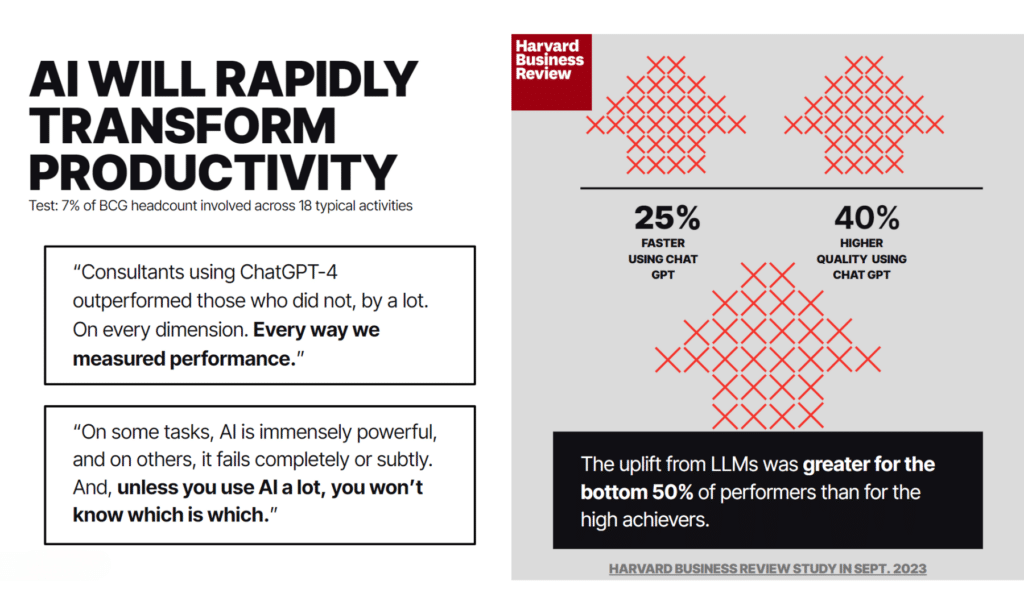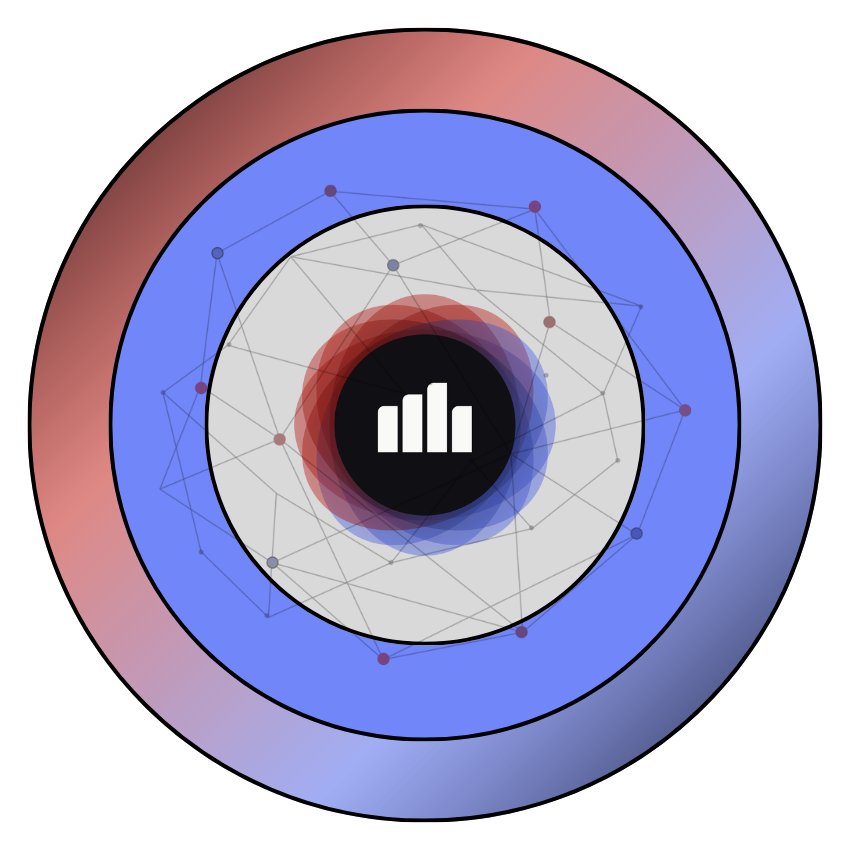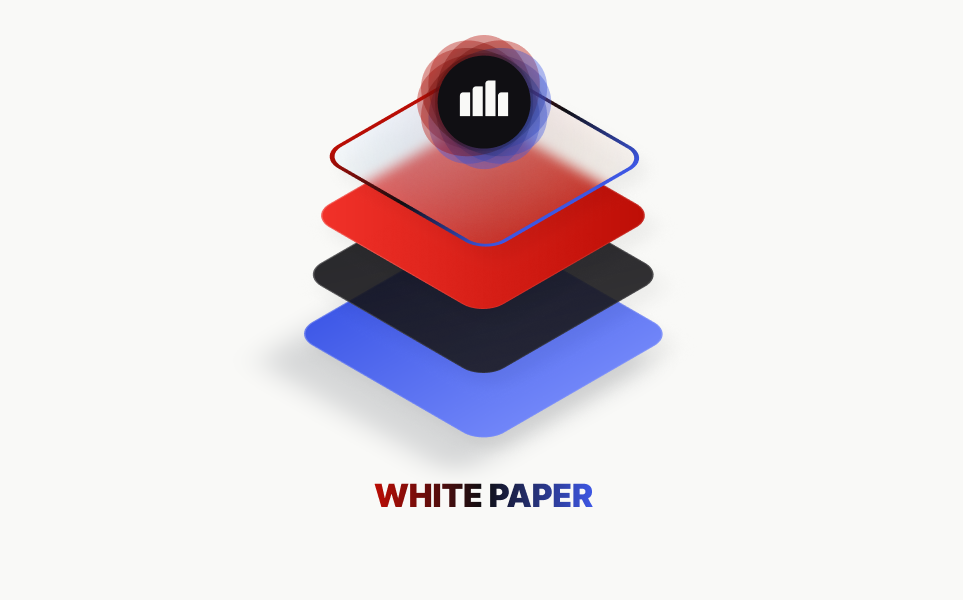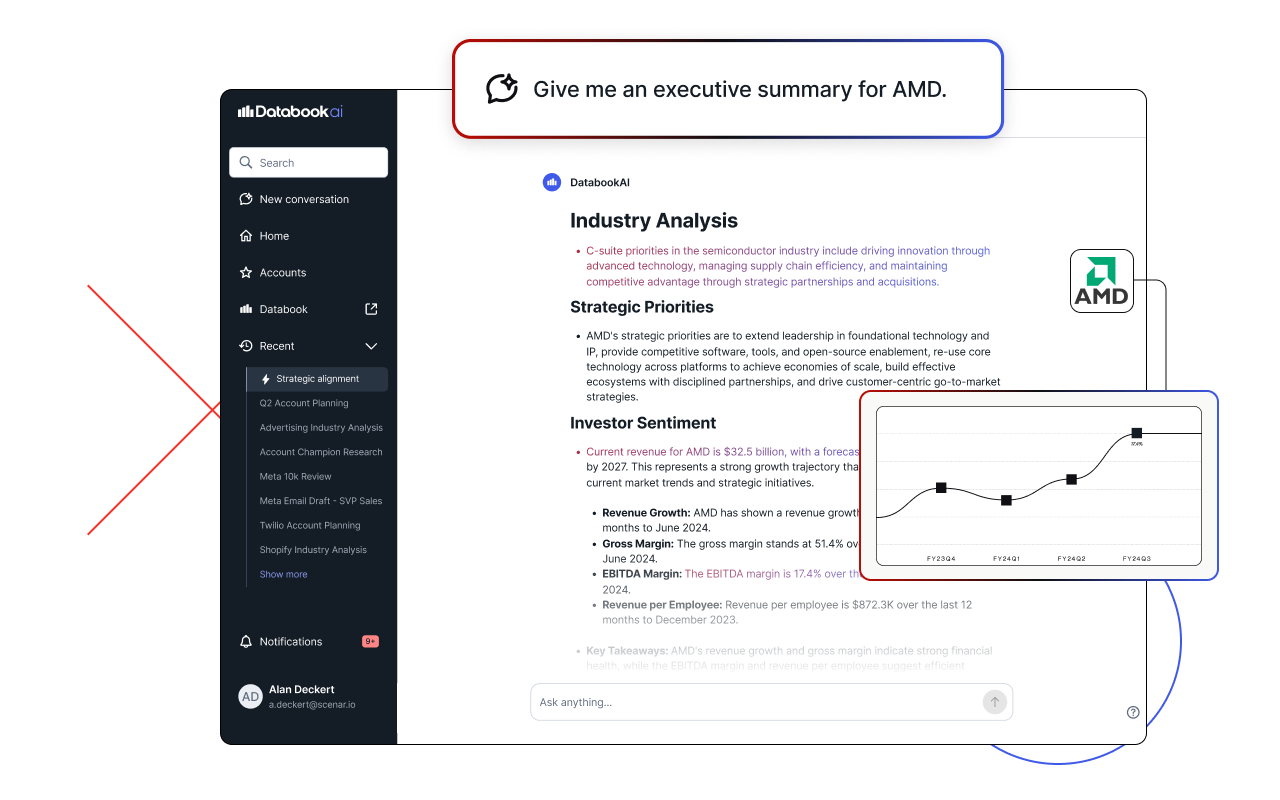Reading Time: 5 minutes
From Data to Deal: How AI Helps Sellers Cut through the Noise
Sarah Close
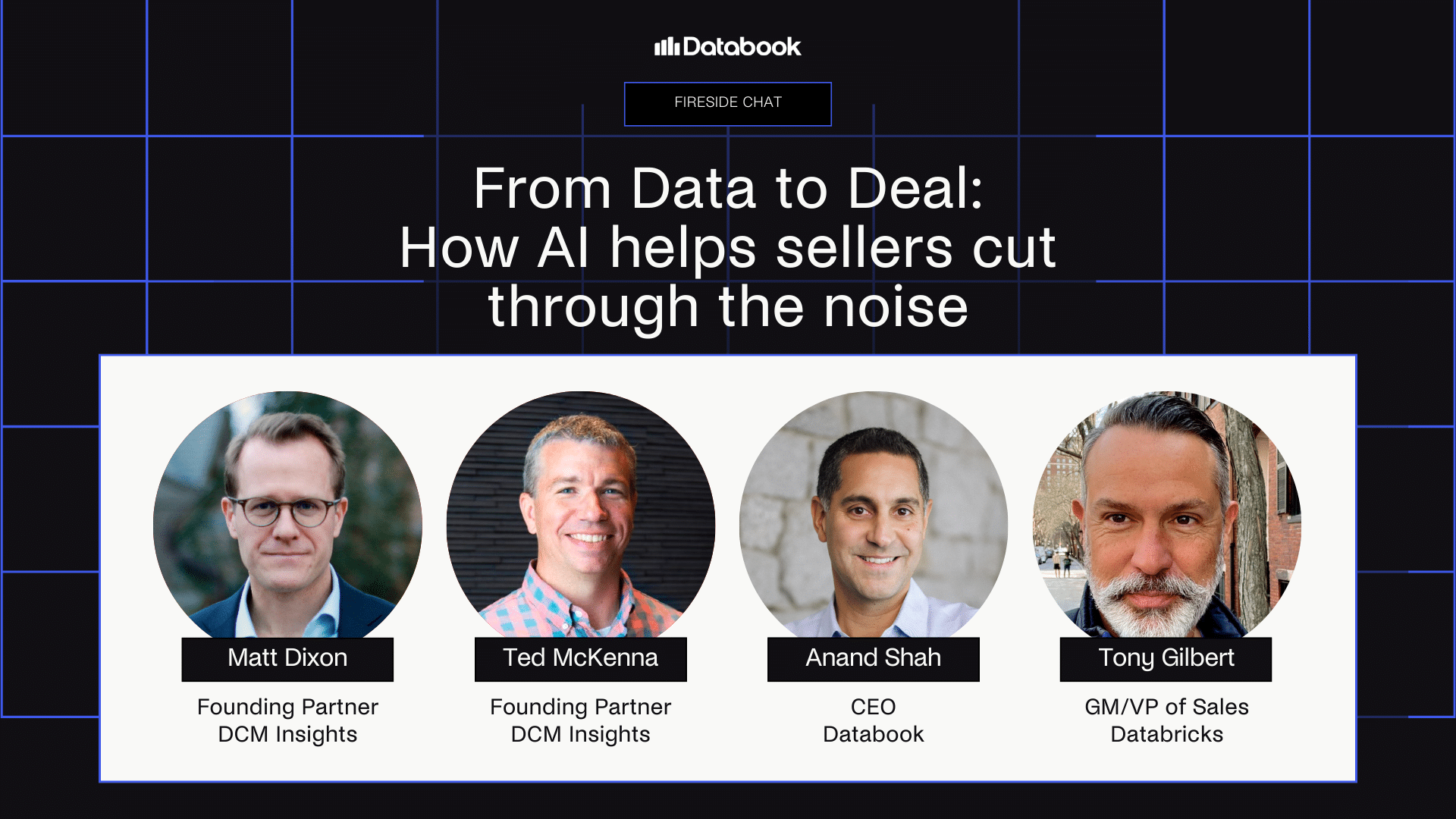
Sellers: Get on board with AI ASAP—or pay a steep price.
This was the primary message in our recent webinar, From Data to Deal, featuring industry experts Matt Dixon and Ted McKenna (co-authors of The JOLT Effect and co-founders of DCMI Research), and Tony Gilbert (VP of Sales, Databricks), along with Databook CEO Anand Shah. The lively discussion presented a comprehensive overview of AI’s impending transformative impact on the sales industry, including unprecedented opportunities for boosting efficiency, enabling data-driven content personalization, and strengthening strategic relationships with buyers.
Here's a deeper dive into three key takeaways that not only show AI’s promise to reshape the sales landscape, but also how sellers must look to harness the power of AI, or risk being left behind.
AI as a Productivity Problem-Solver
AI's impact on enhancing sales productivity cannot be overstated. As Anand highlighted at the start of our event, a recent study from Harvard Business Review found that consultants using ChatGPT were 25% faster and delivered 40% higher quality work than those not leveraging AI tools. This significant boost in efficiency and quality exemplifies AI's growing role as a strategic asset beyond mere operational utility. AI's ability to swiftly process and analyze vast datasets enables sales professionals not only to reduce time spent on account planning and research, but also to leverage the insights hidden within the data when prompting the AI model to create content.
In other words, as AI users and tools gain sophistication, sellers can hit two critical targets with one arrow.
But perhaps the most intriguing find from the study was the way in which AI leveled the productivity playing field for sellers. The bottom 50% of performers saw the greatest boost from their use of AI LLMs—meaning, as Matt Dixon said, “High performers figured out how to get to the mountaintop, and GenAI installed an elevator for everybody else."
Deeper Customer Understanding through Data Analysis
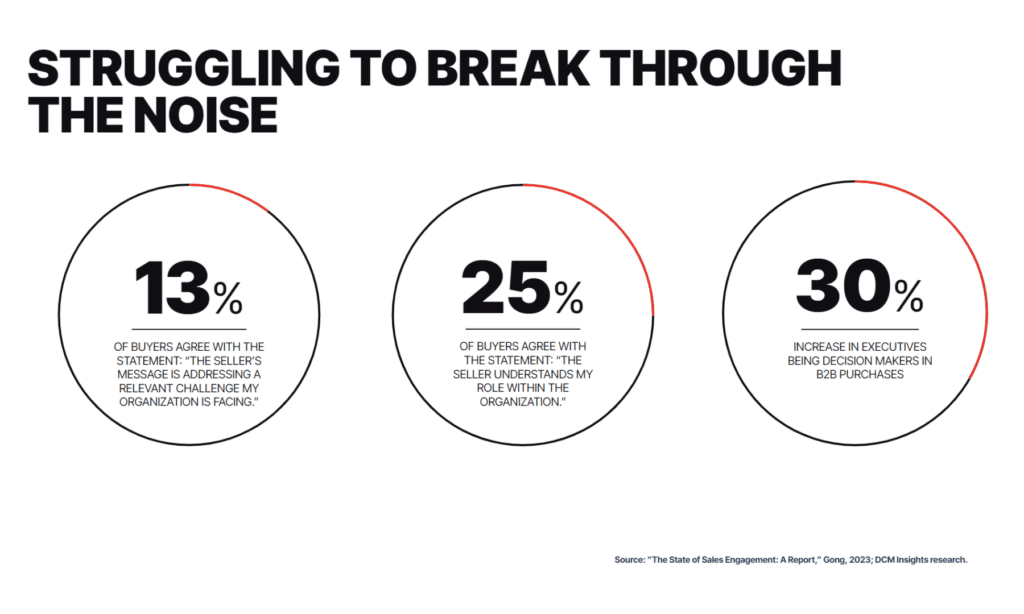
The power of AI to drive personalized customer interactions was another major focus of the webinar. Executive buyers in particular, it seems, are not connecting with sellers’ efforts at outreach or engagement unless they can demonstrate a deep level of understanding. Research from DCMI and Databook found that buyers gravitated toward personalized communications that use specific data around pain points and priorities—because this is how the buyer knows that the seller gets it. They’ve done their homework, and they’re ready to present a relevant solution to the real problems at hand.
AI plays a pivotal role here because it can rapidly connect the dots between buyers and sellers in a way that humans literally cannot do. Today’s advancing LLMs—like our soon-to-be-released DatabookGPT—have the ability to distill oceans of data into contextual narratives that, in turn, give sellers a playbook for personalization they can trust.
What’s interesting to note here, again, is that many sellers just think about “personalized content” from a sales AI in terms of basic content generation. As in, have the AI write your email to Prospect A from Company B. And sure, ChatGPT can do that for you today. But as our event panel discussed, the potential for AI extends way beyond that—and sellers need to start thinking out of the box. The real value isn’t just the content generation; it’s in the trusted insights the AI delivers that enable you to truly personalize that content, so you can connect with buyers in the most meaningful and productive way possible.
Make Way for Your New AI Sales Advisor
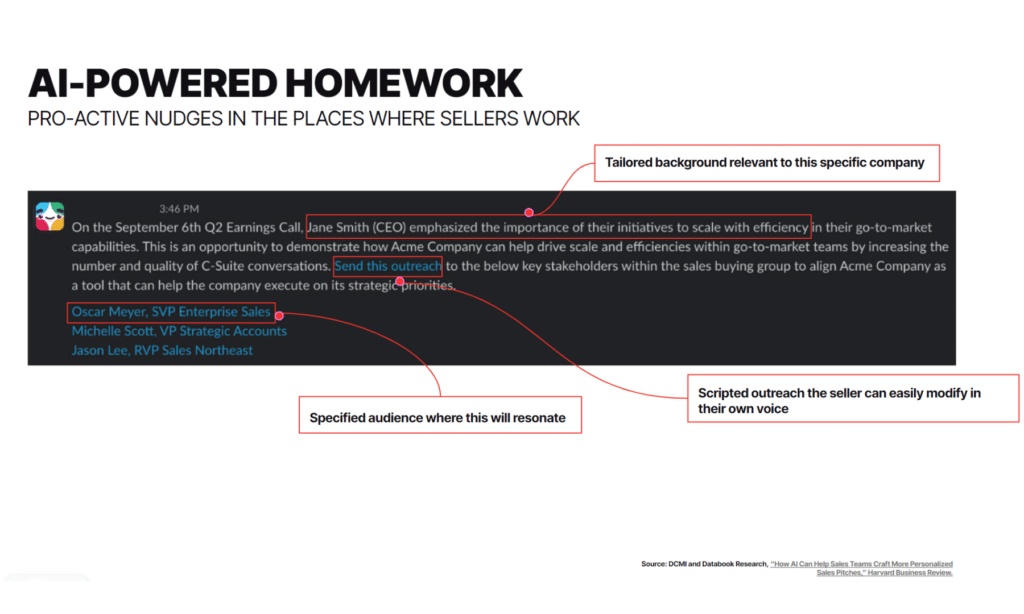
AI might be the great leveler of the playing field, but it's also poised to be the great arbiter of sales success. Our webinar guests were adamant in reminding sellers that as technology progresses, they have to get on board fast—or risk being left behind when competitors take the leap first.
At the same time, our panel was optimistic that most sellers will warmly embrace AI in the not-so-distant future, especially when tools like DatabookGPT will further streamline and enhance sales processes, exponentially boosting seller productivity out of its current slump and up to new heights.
So what’s needed for this future to fully manifest?
As our experts see it, the key ingredients to a successful AI sales advisor include:
A proactive and actionable approach
Existing GPTs and chatbots depend on the user to make a request. That’s not practical for today’s sellers. Think about it: With upwards of 200 dynamic events occurring every year within a single business account (think everything from leadership and personnel changes, to customer changes, product releases, investor reports, press releases, financial and operational changes, impact from interest rates, analyst forecasts, etc.), there’s no way a human can track all of these things—especially over a number of accounts. An AI that’s truly purpose-built for sellers must not only proactively notify sellers when these things occur, but it must also make sense of them and empower the seller to act strategically in response.
Extreme trust and accuracy
Anyone who’s used ChatGPT knows that sometimes it makes mistakes. It also has limitations around what it can search or how recent its dataset is. Most existing chatbots are built this way, to some extent. Looking ahead, however, sellers need an AI that’s freed from these constraints. One that only pulls information from verified and real-time datasets—so, for example, a request for a target account’s strategic priorities doesn’t return a list from three years ago. Or, even worse, something entirely false. There’s a second vital layer to this as well. Not only do sellers need to trust in the data itself, but they need to know that the insights the AI derives from the data are strategically sound for their specific needs. If sellers can’t get trusted insights, then the burden still falls on them to connect the dots. In other words, for an AI to really ramp up seller productivity, it will need grounded data and some mechanism for learning content moderation, so it can craft the most contextually relevant responses for every situation.
Ease of use
This one goes without saying. No one has time for learning curves anymore. The most functional AI for sellers has to have a conversational interface that uses natural language, it has to fit into their existing workflows, and it must meet them in the apps they already use.
Human synergy
This last element sometimes gets overlooked in AI discussions, but as our panel agreed, sellers can’t be relying on AI as a crutch—nor can AI ever be looked at as a replacement for sellers. Looking ahead, the most effective sales strategies will involve a synergy between AI tools and the human, nuanced skills of experienced sales professionals.
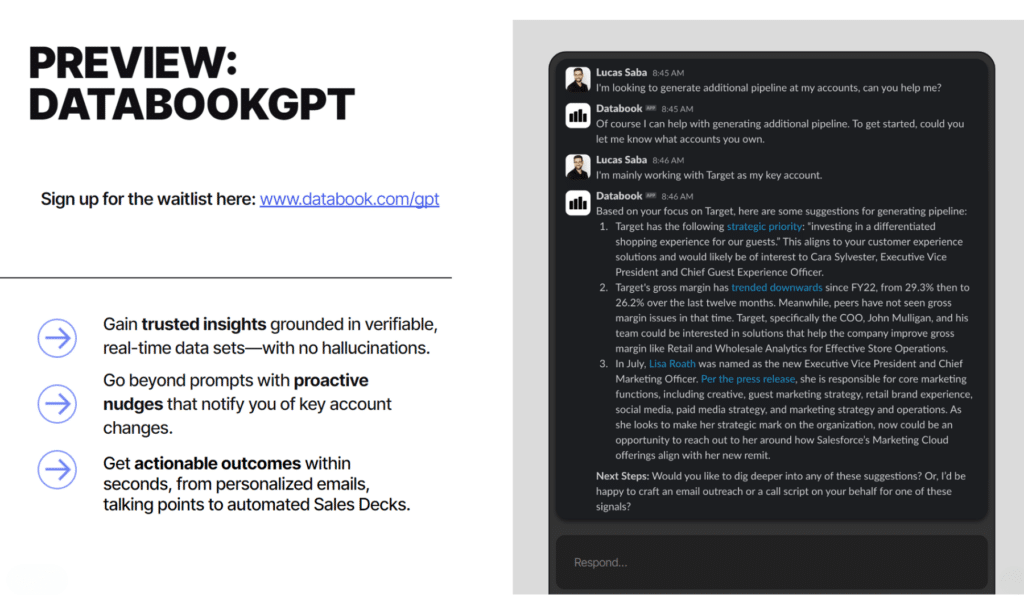
Clearly, the integration of AI into the sales process is more than a passing trend—it represents a fundamental shift towards more efficient, personalized, and predictive sales strategies. As AI technologies advance, their role in sales will undoubtedly expand, providing sales professionals with powerful tools to stay ahead.
For a deeper understanding of these transformative insights, watch the full event recording available on LinkedIn. And if you’re ready to see how DatabookGPT is gearing up to check all the boxes as a trusted AI sales advisor, sign up for our early access waitlist.
